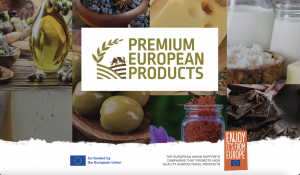Malaysian Market Poised for Growth: Why Greek and Latvian Products Are the Perfect Fit
With rising demand for premium, traceable foods, Malaysia offers big potential for Greek and Latvian products known for quality, tradition, and authenticity.
MALAYSIA, July 8, 2025 /EINPresswire.com/ -- As global demand for high-quality, traceable, and ethically produced food continues to rise, Malaysia has emerged as one of the most promising export markets for European agricultural products—particularly those from Greece and Latvia. Backed by the European Union’s campaign “Premium European Products – Better Knowledge, Better Choices,” the latest promotional initiative focuses on introducing Malaysian consumers to Europe’s finest, from PDO-certified Greek delicacies to Latvian dairy, sweets, and snacks.
Malaysia: A Strategic Market for European Expansion
Malaysia’s evolving food landscape, strong trade infrastructure, and health-conscious middle class make it an ideal gateway for premium European products. Malaysian consumers are increasingly seeking safe, high-quality, and sustainably produced food, aligning perfectly with EU values on food safety, environmental responsibility, and animal welfare.
With its central location in Southeast Asia, Malaysia also serves as a strategic springboard for wider regional distribution, offering European producers access not just to Malaysian households, but to broader ASEAN markets as well.
A Rising Demand for Authenticity and Quality
With Malaysia’s expanding middle class and growing interest in wellness, provenance, and culinary diversity, demand for imported European foods has seen a significant uptick. Greek and Latvian products—many protected under the EU's prestigious PDO (Protected Designation of Origin) scheme—are well-positioned to meet this demand.
“These products aren't just about taste—they represent tradition, traceability, and trust,” said a spokesperson for the EU quality schemes. “Malaysian consumers are discerning, and they are actively seeking products that are responsibly produced, nutrient-rich, and globally certified.”
European Standards that Inspire Confidence
All products promoted under this campaign are manufactured in accordance with strict EU food safety and quality standards. The EU’s farm-to-fork strategy ensures minimal pesticide use, hygiene excellence, and traceability throughout the production chain. Animal welfare is a key priority, with regulations that guarantee ethical treatment, open environments, and healthy living conditions for livestock.
This aligns with growing demand in Malaysia for responsibly sourced and certified products that go beyond taste to reflect sustainability and integrity.
Trade Ties Strengthen as Demand Surges
As trade relations between the European Union and Malaysia continue to strengthen, the import of European agricultural products is on the rise. European exports to Malaysia have shown consistent growth, supported by increasing consumer awareness and trust in European food quality. This surge is supported by targeted campaigns like “Premium European Products,” which elevate product visibility through tastings, educational outreach, and trade engagement.
Among the highlights:
1. Greek PDO products such as Extra Virgin Olive Oil from Kolymvari and Messara, table olives, saffron from Kozani (Krokos Kozanis), raisins, hard cheeses (Graviera Kritis), and mastic gum represent centuries of heritage and unmatched quality.
2. Latvian dairy products are praised for their purity, safety, and animal-friendly production practices, making them an ideal fit for Malaysian consumers who prioritize both nutrition and ethics.
3. Latvian chocolates, candied fruits, and gourmet snacks offer a European twist on indulgence—naturally appealing to Malaysia’s diverse and adventurous taste preferences.
The Greek Contribution: Mediterranean Excellence
Greek exports bring the richness of the Mediterranean to Malaysian homes. Products like PDO Konservolia Rovion and Konservolia Stylidas olives offer natural fermentation methods without chemicals, ensuring purity and Mediterranean taste. Renowned cheeses such as Graviera Kritis and Krokos Kozanis saffron stand out for their heritage, nutritional value, and versatility in both local and international cuisines.
High-quality extra virgin olive oils—like those from Messara, Viannos, and Kolymvari—are already finding their place in Malaysian gourmet cooking, while Mastiha from Chios, an ancient resin with therapeutic uses, offers innovation for both culinary and wellness markets.
Latvia’s Dairy and Confectionery: Innovation Meets Purity
Latvia’s reputation for dairy excellence brings forward products that are both traditional and modern. Curd snacks covered in chocolate or caramel, sour cream with rich texture, semi-hard and organic cheeses, and low-sugar fermented milk drinks resonate with Malaysia’s health-aware consumers. These are complemented by salad cheeses, cottage cheese, and UHT cream, supporting a range of dietary lifestyles from family meals to gourmet plating.
Latvian producers also offer candied fruits, MSG-free potato chips, and Rainforest Alliance-certified chocolates and biscuits, appealing to Malaysia’s growing sustainability-focused retail and hospitality sectors.
For more information about the "Premium European Products" campaign, please visit https://premiumeuropeanproducts.eu/ or email us to info@premiumeuropeanproducts.eu.
Pages dedicated to this program can be found on Instagram, Facebook and YouTube, @premiumeuropeanproducts.
Notes to Editor
About National Union of Agricultural Cooperatives of Greece (ETHEAS)
Founded by Greece's leading cooperatives and established by Greek law, ETHEAS is the national coordinating body of Agricultural Cooperatives in Greece. With over 300 member cooperatives representing approximately 80% of Greece's total agricultural cooperative turnover, ETHEAS aims to foster rural and cooperative development, support and promote its members' activities domestically and internationally, provide expert opinions on cooperative movement agricultural production and sector development, supervise the dissemination and promotion of cooperative ideas, and serve and educate its members through studies, research projects, and assignments.
About Latvian Dairy Committee (LDC)
The Latvian Dairy Committee (LDC), established in 1995, represents Latvian dairy processing sector and aims to protect its interests. It consists of 17 members processing approximately 80% of industrially produced milk in Latvia.
Claresta Harlis
Terroir and Spice
claresta.harlis|terroir-and-spice.com| |claresta.harlis|terroir-and-spice.com
Visit us on social media:
Instagram
Facebook
YouTube
Legal Disclaimer:
EIN Presswire provides this news content "as is" without warranty of any kind. We do not accept any responsibility or liability for the accuracy, content, images, videos, licenses, completeness, legality, or reliability of the information contained in this article. If you have any complaints or copyright issues related to this article, kindly contact the author above.
A' International Engineering, Construction and Infrastructure Design Awards Call for Nominations
Virtual Reality Gaming Set for Steady Growth with 4.7% CAGR by 2032
Autonomous Vehicles Market Poised for Explosive Growth, Valued at USD 258.69 Billion by 2035
Więcej ważnych informacji
 Jedynka Newserii
Jedynka Newserii

 Jedynka Newserii
Jedynka Newserii

Polityka

D. Joński: Nie wiemy, co zrobi Rosja za dwa–trzy lata. Według duńskiego wywiadu może zaatakować kraje nadbałtyckie i musimy być na to gotowi
Zdecydowana większość krajów unijnych wskazuje na potrzebę wzmocnienia zdolności obronnych Europy w obliczu coraz bardziej złożonego geopolitycznego tła. Wywiady zachodnich państw wskazują, że Rosja może rozpocząć konfrontację z NATO jeszcze przed 2030 rokiem. Biała księga w sprawie obronności europejskiej „Gotowość 2030” zakłada m.in. ochronę granic lądowych, powietrznych i morskich UE, a sztandarowym projektem ma być Tarcza Wschód. – W budzeniu Europy duże zasługi ma polska prezydencja – ocenia europoseł Dariusz Joński.
Transport
Duże magazyny energii przyspieszą rozwój transportu niskoemisyjnego w Europie. Przyszłością może być wodór służący jako paliwo i nośnik energii

Zmiany w europejskim transporcie przyspieszają. Trendem jest elektromobilność, zwłaszcza w ramach logistyki „ostatniej mili”. Jednocześnie jednak udział samochodów w pełni elektrycznych w polskich firmach spadł z 18 do 12 proc., co wpisuje się w szerszy europejski trend spowolnienia elektromobilności. Główne bariery to ograniczona liczba publicznych stacji ładowania, wysoka cena pojazdów i brak dostępu do odpowiedniej infrastruktury. – Potrzebne są odpowiednio duże magazyny taniej energii. Przyszłością przede wszystkim jest wodór – ocenia Andrzej Gemra z Renault Group.
Infrastruktura
W Polsce w obiektach zabytkowych wciąż brakuje nowoczesnych rozwiązań przeciwpożarowych. Potrzebna jest większa elastyczność w stosowaniu przepisów

Pogodzenie interesów konserwatorów, projektantów, inwestorów, rzeczoznawców i służby ochrony pożarowej stanowi jedno z największych wyzwań w zakresie ochrony przeciwpożarowej obiektów konserwatorskich. Pożary zabytków takich jak m.in. katedra Notre-Dame w Paryżu przyczyniają się do wprowadzania nowatorskich rozwiązań technicznych w zakresie ochrony przeciwpożarowej. W Polsce obowiązuje już konieczność instalacji systemów detekcji. Inwestorzy często jednak rezygnują z realizacji projektów dotyczących obiektów zabytkowych z uwagi na zmieniające się i coraz bardziej restrykcyjne przepisy czy też względy ekonomiczne.
Partner serwisu
Szkolenia

Akademia Newserii
Akademia Newserii to projekt, w ramach którego najlepsi polscy dziennikarze biznesowi, giełdowi oraz lifestylowi, a także szkoleniowcy z wieloletnim doświadczeniem dzielą się swoją wiedzą nt. pracy z mediami.




![Nestlé w Polsce podsumowuje wpływ na krajową gospodarkę. Firma wygenerowała 0,6 proc. polskiego PKB [DEPESZA]](https://www.newseria.pl/files/1097841585/fabryka-nesquik_1,w_85,r_png,_small.png)




.gif)

 |
| |
| |
|